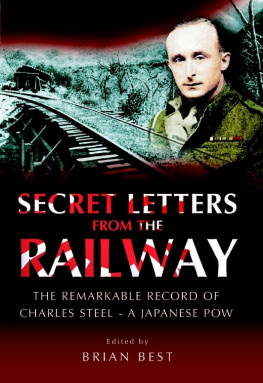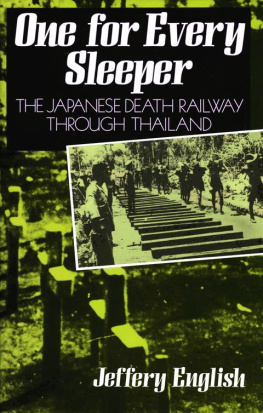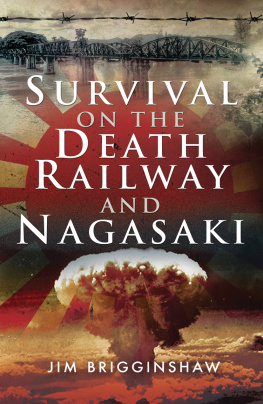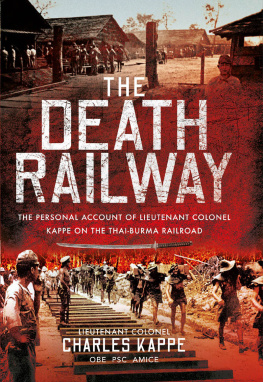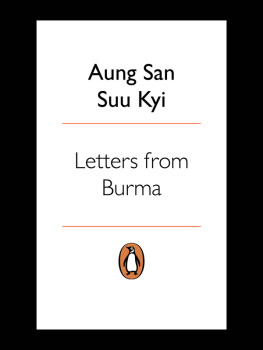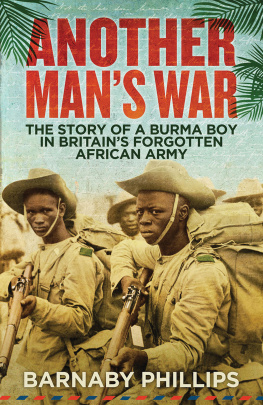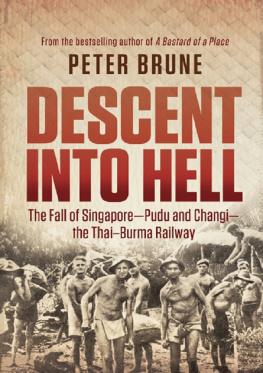Charles Steel - Burma railway man : Secret letters from a Japanese POW
Here you can read online Charles Steel - Burma railway man : Secret letters from a Japanese POW full text of the book (entire story) in english for free. Download pdf and epub, get meaning, cover and reviews about this ebook. City: Barnsley, year: 2013, publisher: Pen & Sword Books Ltd, genre: Non-fiction. Description of the work, (preface) as well as reviews are available. Best literature library LitArk.com created for fans of good reading and offers a wide selection of genres:
Romance novel
Science fiction
Adventure
Detective
Science
History
Home and family
Prose
Art
Politics
Computer
Non-fiction
Religion
Business
Children
Humor
Choose a favorite category and find really read worthwhile books. Enjoy immersion in the world of imagination, feel the emotions of the characters or learn something new for yourself, make an fascinating discovery.

- Book:Burma railway man : Secret letters from a Japanese POW
- Author:
- Publisher:Pen & Sword Books Ltd
- Genre:
- Year:2013
- City:Barnsley
- Rating:4 / 5
- Favourites:Add to favourites
- Your mark:
- 80
- 1
- 2
- 3
- 4
- 5
Burma railway man : Secret letters from a Japanese POW: summary, description and annotation
We offer to read an annotation, description, summary or preface (depends on what the author of the book "Burma railway man : Secret letters from a Japanese POW" wrote himself). If you haven't found the necessary information about the book — write in the comments, we will try to find it.
Burma railway man : Secret letters from a Japanese POW — read online for free the complete book (whole text) full work
Below is the text of the book, divided by pages. System saving the place of the last page read, allows you to conveniently read the book "Burma railway man : Secret letters from a Japanese POW" online for free, without having to search again every time where you left off. Put a bookmark, and you can go to the page where you finished reading at any time.
Font size:
Interval:
Bookmark:
BRIAN BEST

and reprinted in this format in 2013 and 2014 by
PEN & SWORD MILITARY
An imprint of
Pen & Sword Books Ltd
47 Church Street
Barnsley
South Yorkshire
S70 2AS
of this work has been asserted by him in accordance with
the Copyright, Designs and Patents Act 1988.
available from the British Library.
transmitted in any form or by any means, electronic or mechanical
including photocopying, recording or by any information storage and
retrieval system, without permission from the Publisher in writing.
By CPI Group (UK) Ltd, Croydon, CR0 4YY
Pen & Sword Family History, Pen & Sword Maritime, Pen & Sword Military,
Pen & Sword Discovery, Pen & Sword Politics, Pen & Sword Archaeology,
Pen & Sword Atlas, Wharncliffe Local History, Wharncliffe True Crime,
Wharncliffe Transport, Pen & Sword Select, Pen & Sword Military Classics,
Leo Cooper, The Praetorian Press, Claymore Press, Remember When,
Seaforth Publishing and Frontline Publishing.
PEN & SWORD BOOKS LIMITED
47 Church Street, Barnsley, South Yorkshire, S70 2AS, England
E-mail: enquiries@pen-and-sword.co.uk
Website: www.pen-and-sword.co.uk
Font size:
Interval:
Bookmark:
Similar books «Burma railway man : Secret letters from a Japanese POW»
Look at similar books to Burma railway man : Secret letters from a Japanese POW. We have selected literature similar in name and meaning in the hope of providing readers with more options to find new, interesting, not yet read works.
Discussion, reviews of the book Burma railway man : Secret letters from a Japanese POW and just readers' own opinions. Leave your comments, write what you think about the work, its meaning or the main characters. Specify what exactly you liked and what you didn't like, and why you think so.


